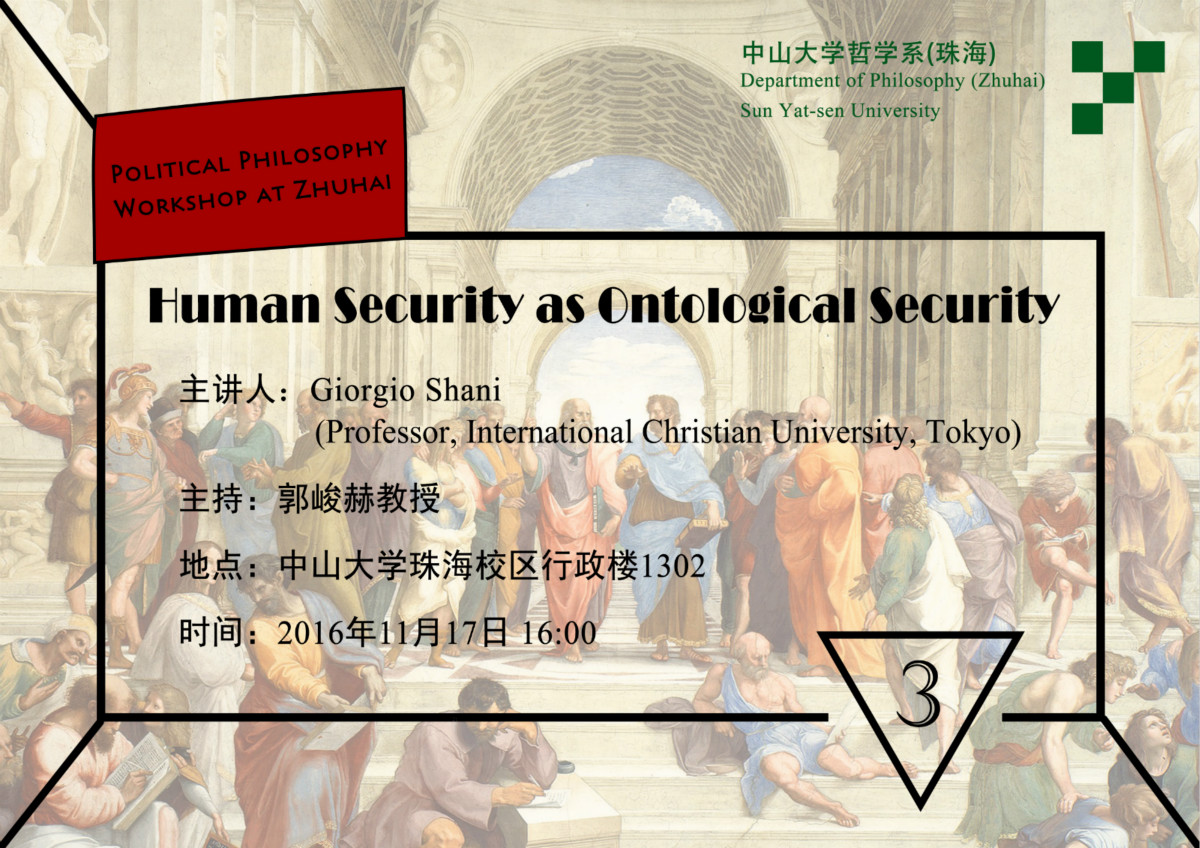Political Philosophy Workshop(III):Human Security as Ontological Security?
人类安全等同于本体安全?

Political Philosophy Workshop (III)
Organizer: Department of Philosophy (Zhuhai),Sun Yat-sen University
Topic: Human Security as Ontological Security?
Speaker: Giorgio Shani (Professor, International Christian University,Japan)
Moderator: Jun-Hyeok Kwak (Professor, Sun Yat-sen University)
Venue: R1302 Administrative Building of SYSU, Zhuhai Campus.
This paper seeks to critically interrogate the view that the emergence of ‘Human Security’ can be seen as a response to the ontological insecurity wrought by the globalization of neo-liberalism. For Giddens (1991:47) , to be ‘ontologically secure is to possess, on the level of the unconscious and practical consciousness, “answers” to fundamental existential questions which all human life in some way addresses.’ Religion and nationalism provide ‘answers’ to these questions in times of rapid socio-economic and cultural change (Kinvall 2004). The dislocation engendered by successive waves of neoliberal globalization has resulted in the deracination of many of the world’s inhabitants resulting in a state of collective ‘existential anxiety’ (Giddens 1991). Under such conditions of existential anxiety, the search for identity and community becomes paramount.
However, secular conceptions-including ‘critical’ accounts- of Human Security as ‘freedom from fear and want’ (Commission on Human Security 2003) fail to take into account the importance of identity for security. It will be suggested that a ‘postsecular’ understanding of Human Security (Shani 2014) is better able to provide ontological security in times of rapid global transformation but only if it accounts for the centrality of religion to post-colonial subjectivity as a legacy of colonialism.
Prof. Giorgio Shani is Professor of Politics and International Relations at International Christian University (ICU) in Japan and is currently a Visiting Senior Fellow at the London School of Economics and Political Science (LSE). He is President of the Asia Pacific Region of the International Studies Association (ISA). His research interests focus on religion, security and post-western International Relations theory.
Prof. Shani is author of two single authored books, Sikh Nationalism and Identity in a Global Age (Routledge 2008) and Religion, Identity and Human Security (Routledge 2014). For more details see here: https://www.routledge.com/products/9780415509060.
Political Philosophy Workshop系列第三讲
主办:中山大学哲学系(珠海)
主题:人类安全等同于本体安全?
主讲人:Giorgio Shani(国际基督教大学教授)
主持:郭峻赫(中山大学教授)
时间:2016年11月17日下午16:00
地点:中山大学珠海校区行政楼1302室
摘要:
本文试图批判性地审视 “人类安全”观点的形成可被视为对新自由主义全球化所造成的本体论不安全的回应。吉登斯认为(1991:47),“本体安全在无意识和实践意识的层面上,拥有对所有人类生活以某种方式解决基本存在问题的‘答案’”。在快速的社会经济和文化变革时期(Kinvall 2004),宗教和民族主义提供了解决这些问题的“答案”。由新自由主义带来的一波波全球化浪潮造成的混乱导致全球许多居民与本国世界熟习的环境隔绝,并引发集体“存在性焦虑”的状态(吉登斯,1991年)。在这种存在性焦虑的情况下,寻找身份及社会团体变得至关重要。
然而,包括某些“批判性”见解在内,大众观念一直将人类安全理解为“免于恐惧和匮乏的自由”(人类安全委员会,2003),而没有考虑到身份认同对于安全的重要性。在瞬息万变的全球转型时期,对于人类安全“后世俗”的认识(萨尼,2014),本文倡议以保证本体安全为佳,然而这必须有赖于宗教作为殖民主义的遗产对后殖民主体性所产生的核心作用。
Giorgio Shani:日本国际基督教大学(ICU)政治学和国际关系学专业的教授,目前于伦敦政治经济学院(LSE)作高级访问学者,担任国际研究协会(ISA)亚太地区的主席,其研究重点集中于宗教、安全和后西方国际关系理论。
乔治·萨尼教授是两本独撰书籍的作者——《全球化背景下锡克教徒的民族主义以及身份认同》(劳特里奇出版社 2008)以及《宗教、身份认同以及人类安全》(劳特里奇出版社 2014)。
更多资料请查询https://www.routledge.com/products/9780415509060.


